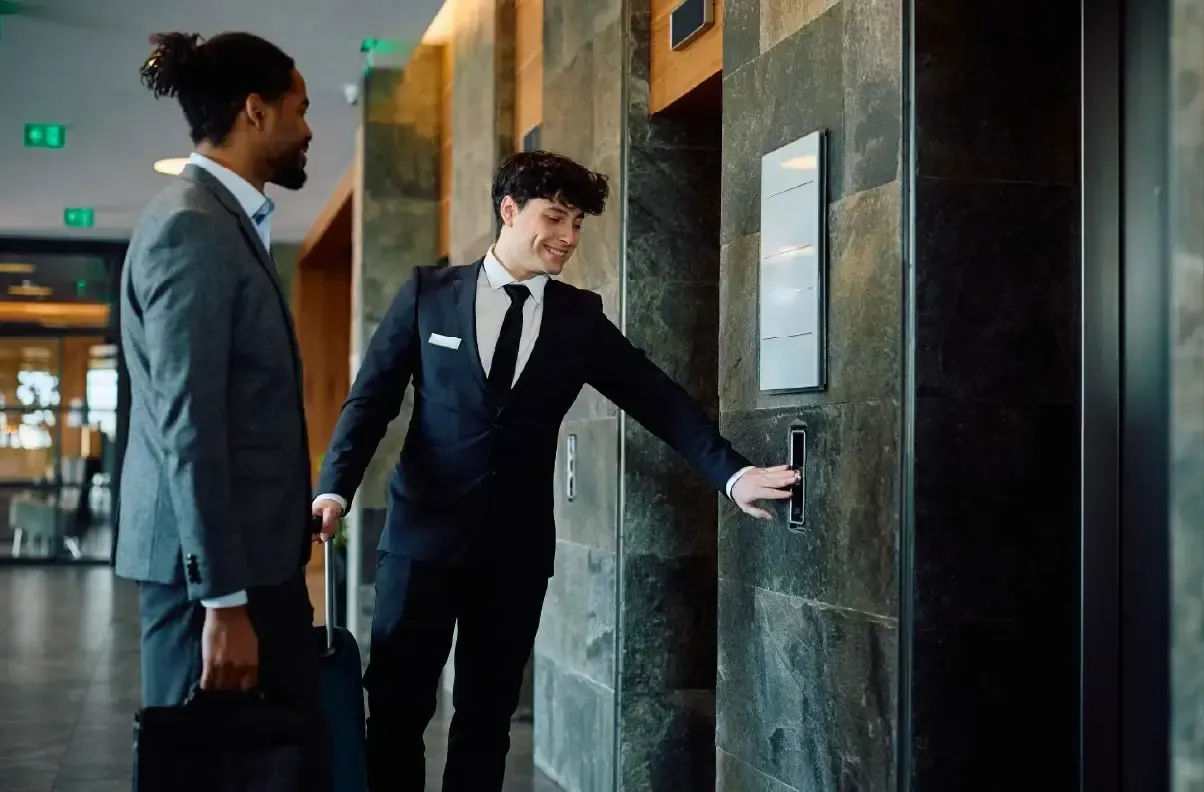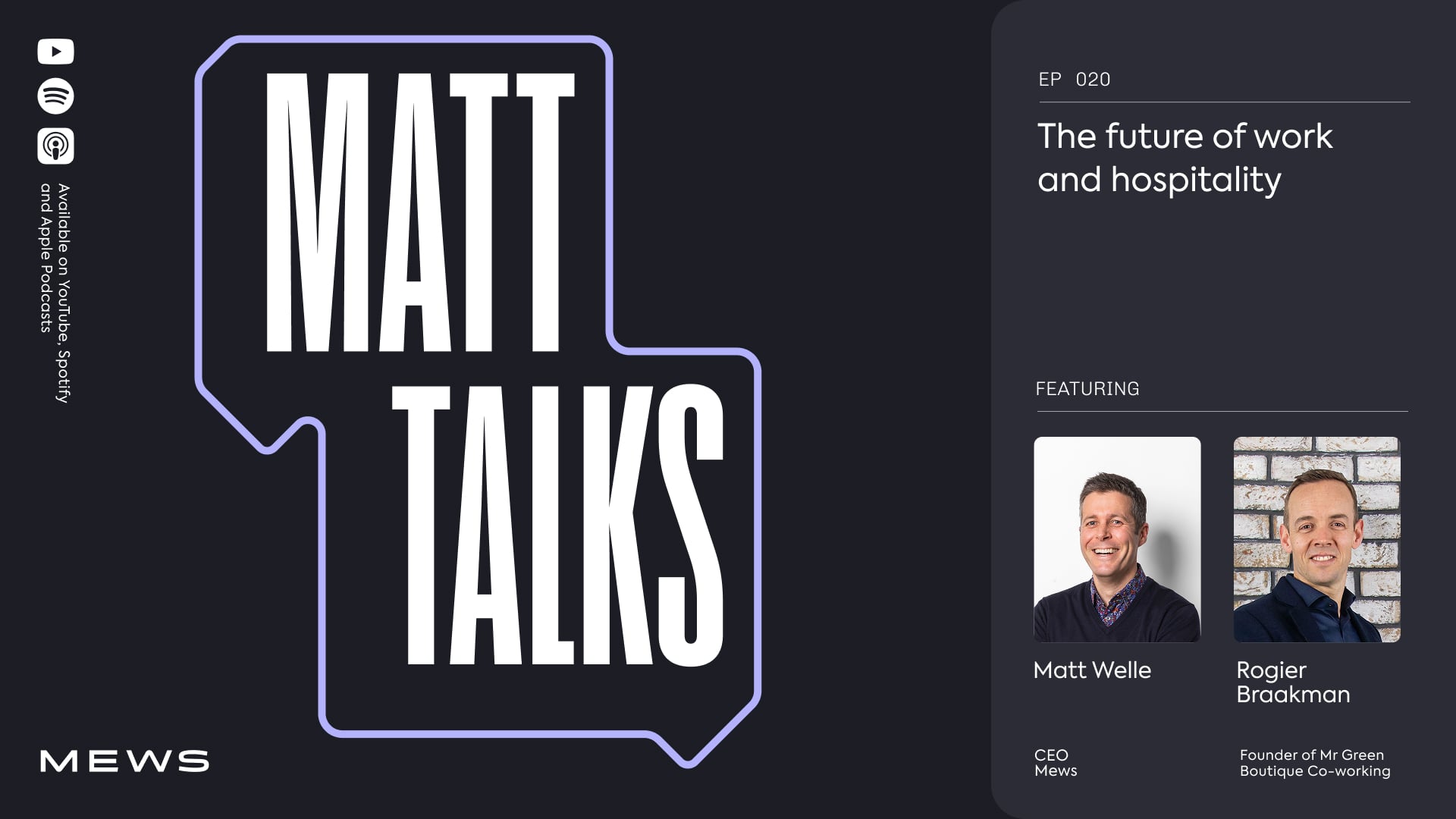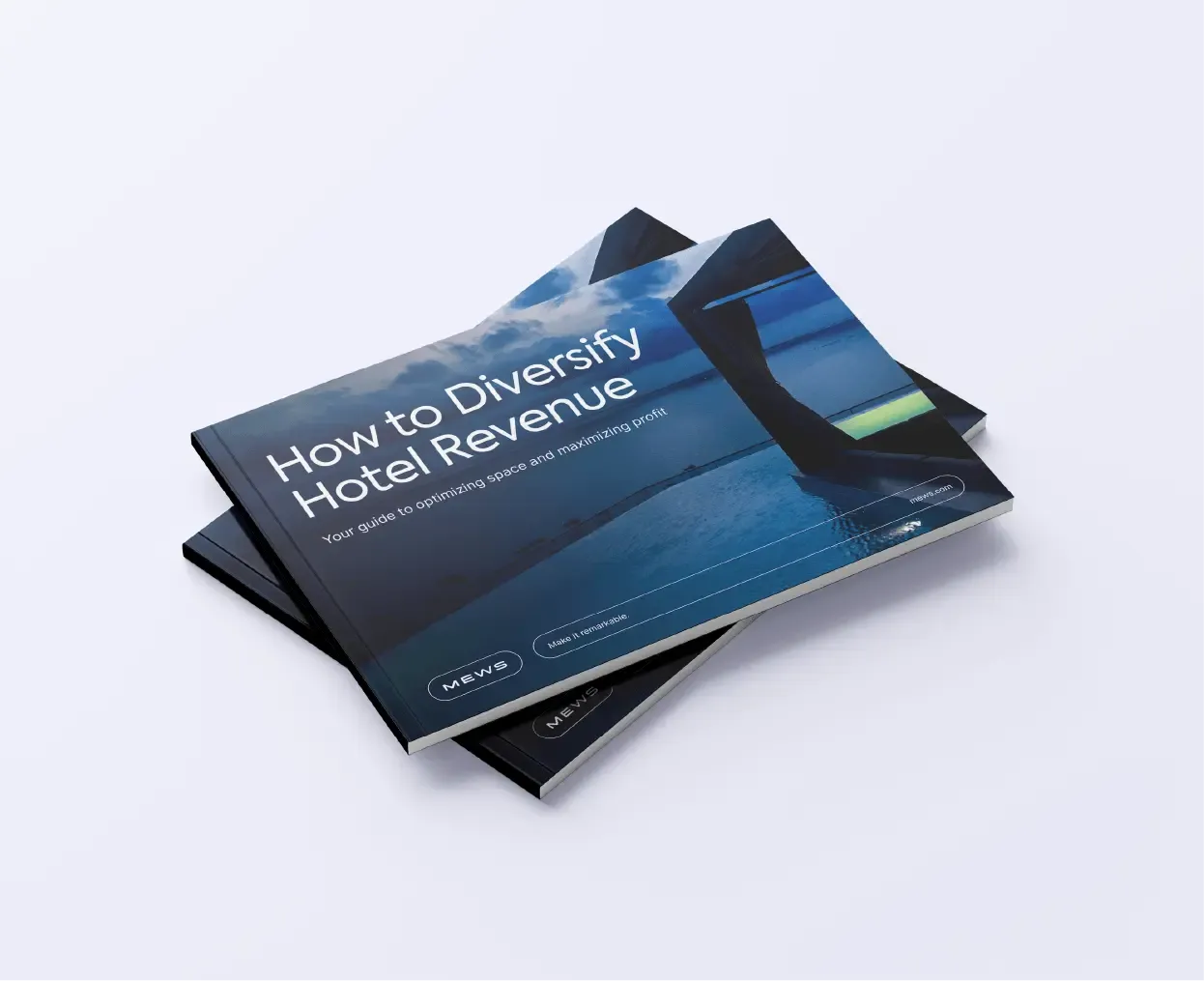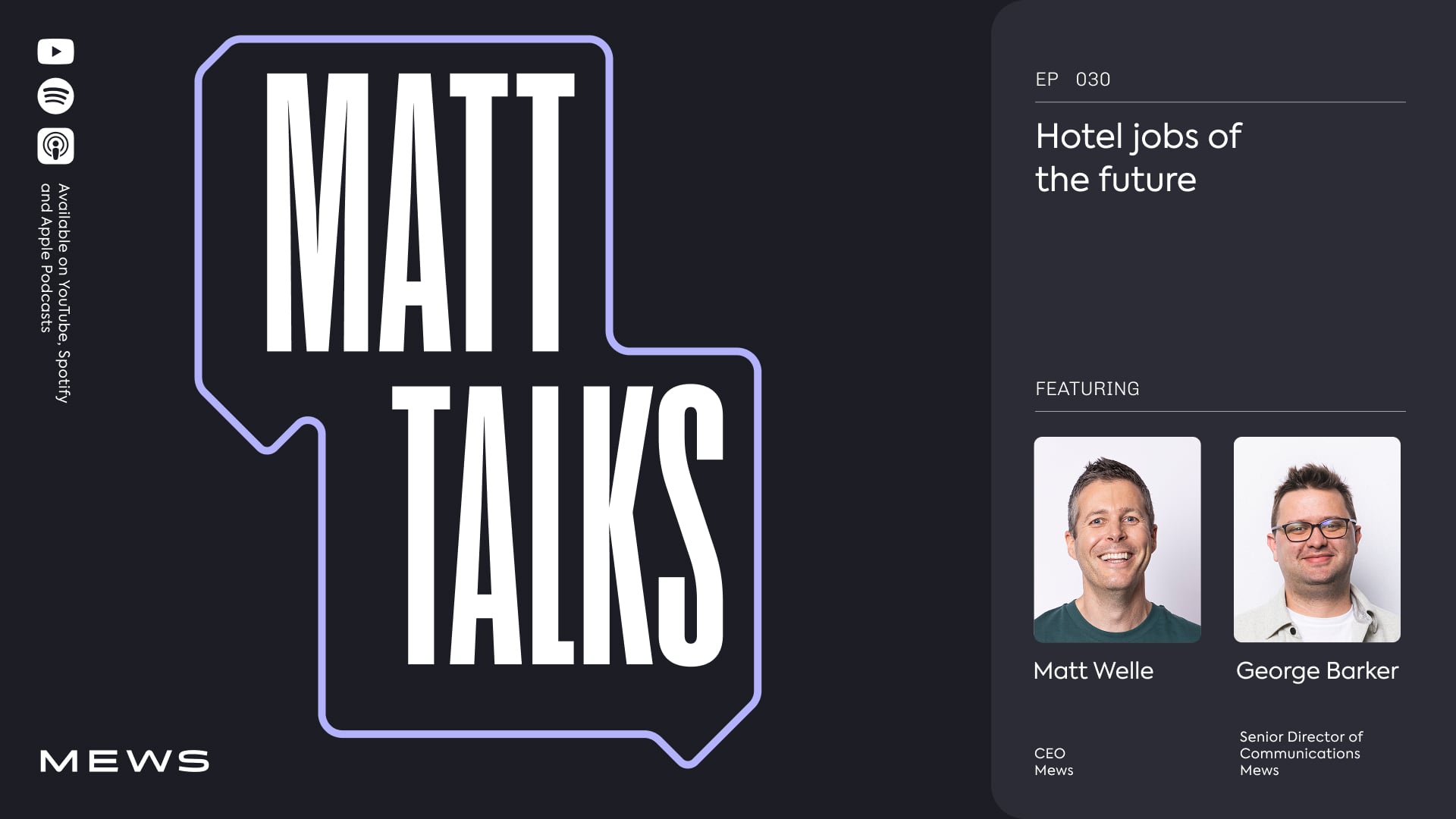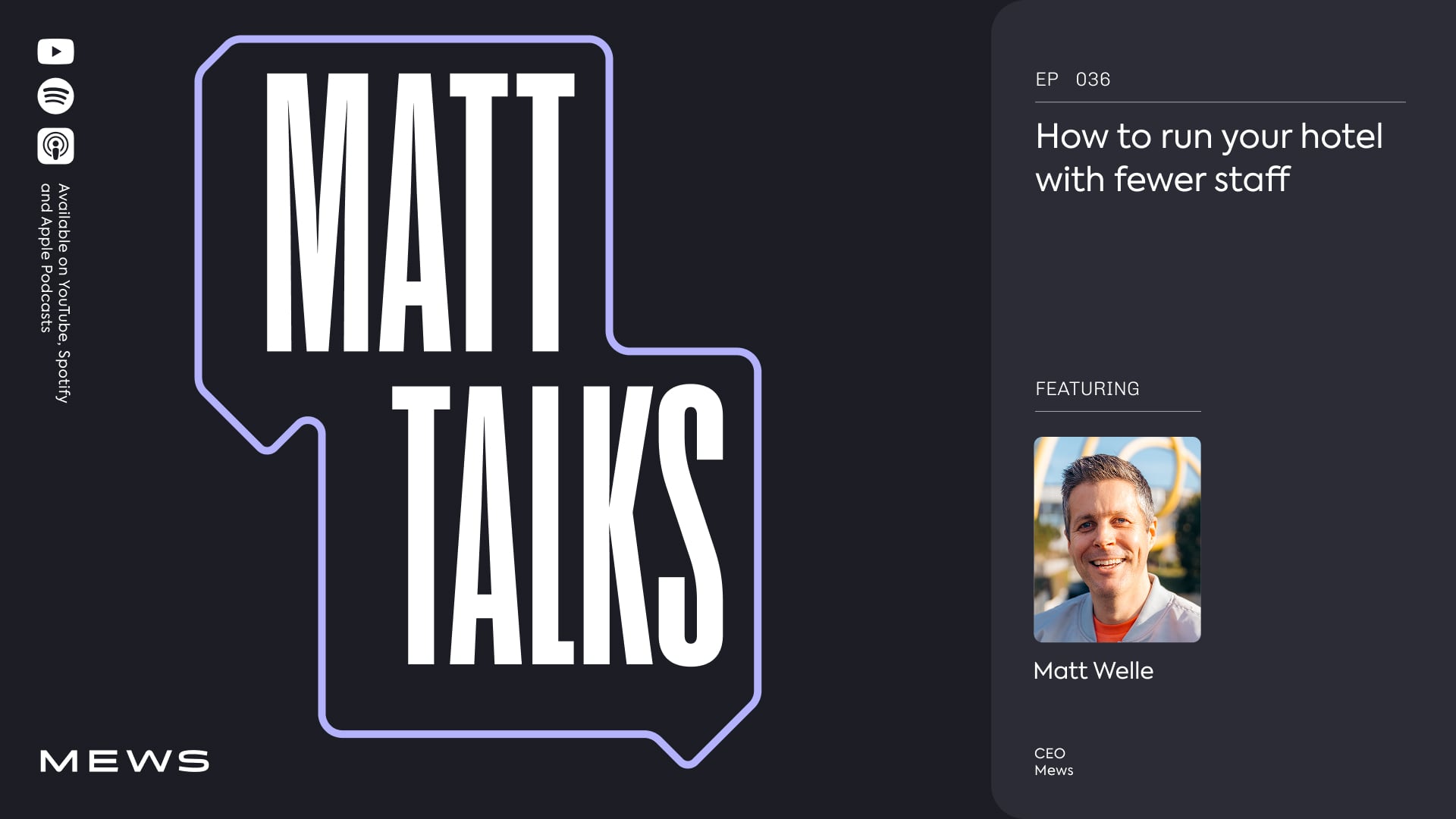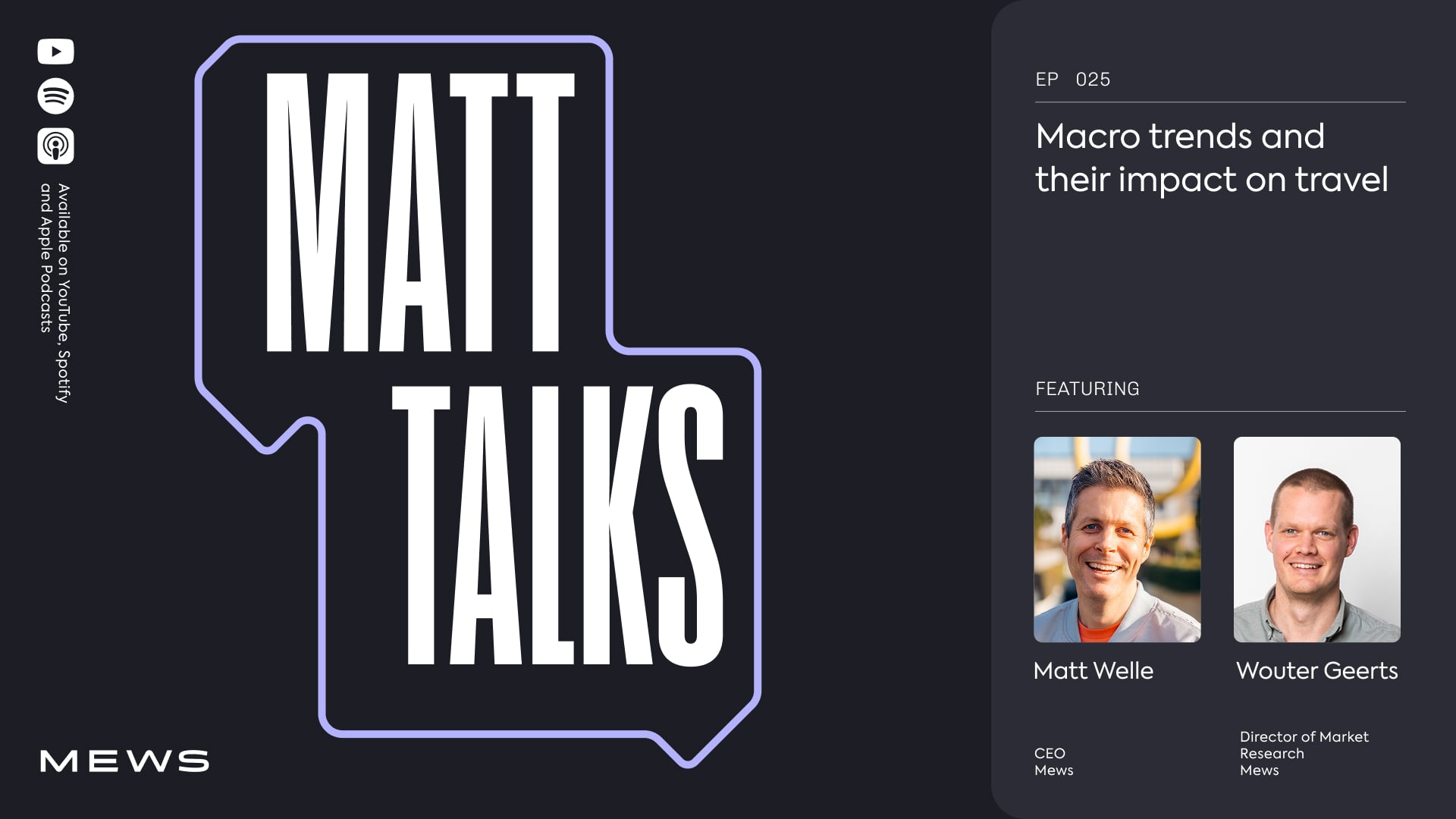What to expect?
Meet your speakers

Matthijs Welle
CEO, Mews
After years in the trenches of hospitality, Matt joined the Mews journey during its early days in 2013. Since then, he’s been our fearless CEO, leading the company and the industry forward.
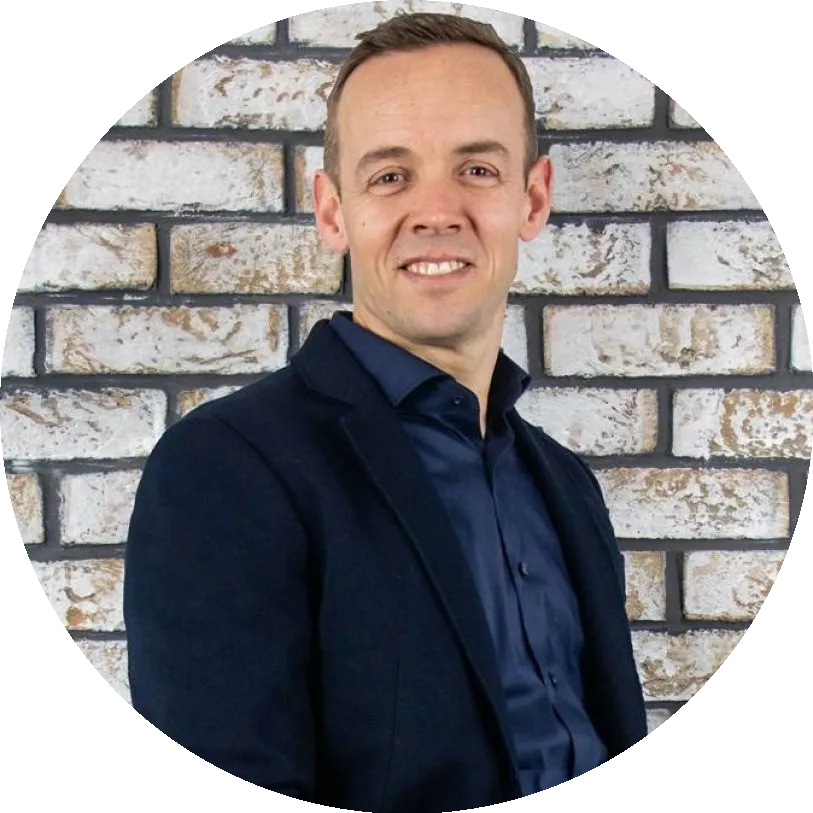
Rogier Braakman
CEO, Mr Green Boutique Office Collection
Rogier Braakman is an experienced entrepreneur with a background in hospitality and tech. As CEO of Mr. Green, he’s focused on making office space more flexible, efficient and sustainable.
Episode chapters
Transcript
Introduction to the future of work
Hi, everyone. Welcome back. This is another episode of Matt Talks. And this time I thought I'd bring someone in to talk about something completely different. Rogier is joining to talk about us, the future of work and how you book desks in very cool places, which feels left field, but there is definitely a connection to hospitality. But maybe let's start with a short introduction, Ro. What do you do?
Yeah. Thanks, Matt. Normally, I call you Matthijs, right?
But since we're in an international audience You can go in whatever you want to call me.
Let's let's stay to the MET Talks. No, I'm both here. So, I've been a hotelier basically ever since I graduated just like you from Hotel City Hay.
Worked for Ritz Carlton, worked for Hilton. Then for London Green Park, started my own hotel company back in the days in two thousand and four, first Sinton hotels. Then later we evolved it into Pillows Hotels.
So was, one of the co founders of Pillows Hotels. Still proud of that product that's out there, right? Really luxury boutique hotels. And then after some, after I sold my shares and starting a small investment firm, basically focusing on tech and distribution, I became CEO at Penta Hotels at, beginning of twenty twenty, one month before the pandemic hit us.
And then I realized again like, Wow, hotel business is really cool to work in, but, you're the last one to fill and the first one to be empty. Right? So you need to make sure that you've got proper revenue streams and so on. And, super cool company, super proud of everything we've achieved and how we've recovered out of, out of COVID.
And then, a year ago, I started working in a completely different field for me, which was, the world of misoprene offices, which was founded like ten years ago by a friend of mine, a business friend who I've met already in two thousand eight. And basically what we're doing, I at least I perceive it as that we are the hotels of offices. And there are many office operators that call themselves like hotelish kind of, facilities, which they have. Don't get me wrong, often that's based on the hospitality they give, like good food and beverages, gyms, and all kinds of nice perks, right, to actually lure, employees back into the offices.
But what we are doing is literally we've put technology basically as the center of our office experience. So what we have done is we've literally created workstations, fully equipped desks with, with the best hardware in the market that we control remotely. Meaning that these desks can take on the identity of an office user at any moment in time. Meaning that companies now can really fluctuate with their needs of their offices throughout the weeks. And that is something that I did not see anywhere else.
Chapter
Occupancy in hotels
And then to finalize this introduction is in hotel business, we always play the occupancy game, right? We're always like, it's the first question as a hotel manager or as a CEO. What was the occupancy? What was the average daily rate? How many tables in a restaurant did you, did you book? And in offices, it's literally the other way around. I mean, the office world, we like to let or lease out fixed office spaces.
And then whether you use it or not, I don't care. I'll give you a one year, five year contract. Whether you use it to the max on Tuesdays and Thursdays and empty it on Friday. We don't care.
But I do care because we feel that there's a huge mismatch between real estate nowadays, occupancy and the way it's been used. And especially when you're from hotel business, and I think you and I've discussed this before, I can't stand a nice product being empty all the time, whereas we are just short of real estate. And that's, and that's a puzzle we're trying to crack. And yeah, definitely when we look at this from a hospitality perspective, it's just a massive, interesting market to tap into.
So I'm going to come back to that because I find the co working or co officing is what I think.
Yeah, we call it co officing.
I want you to explain this later.
But I want to go back to your hotel history because you're one of the most passionate hoteliers that I've met, and I've met many hoteliers.
Chapter
The damage of legacy in hospitality
And there was this question that Naomi, our chief people officer, said is her favorite question in an interview.
No. That actually, this question came from our chief, technology officer.
He asks, what's the legacy you've left behind? And you've built real brands from the ground up and then led these brands, through quite a transformation. So if you think back to some of those hotel companies, what's the legacy that you've left behind where you can go back in and say, that's all here?
Well, I think most of it's honestly the people.
With Centen hotels, we've literally created the brand from the bottom up and we did not have any money. We just had a lot of enthusiasm and I think a lot of conviction. And we try to actually build hotel one, two, and three. And with every hotel, we evolved in how we would perceive the product it to be. Meaning that the first hotel was completely different from the sixth or the seventh hotel. Yeah. So that there was a huge discrepancy basically between the offered services.
But the people in the end, I mean, you either work with people, right? So I think we were always able to attract people that believed in the same mission and say, okay, let's put the guest central and so on. And we see this everywhere. That's not unique anymore.
I think with pillows, we decided to actually uniformize way more the guest experience, which I'd been trained to do so at Ritz Carlton back in nineteen ninety nine, right? Where ladies and gentlemen serve ladies and gentlemen and, and service our standards. As a Dutch shea, I never really understood this, but it's literally, it's just a term of or a set of fixed terms that you agree on together. So you pick up the phone within three rings, you say, Hi, thank you for calling the Ritz Carlton Atlanta.
This is okay. How may I assist you, Mr. Miller? This is just something you can train.
You can train service.
But you can't train authenticity, I think.
And therefore I think you just need followers. You just want to have people like yourself, right? People say like this mad guy, he's really on a mission to change something. And we've always tried to change something.
So with Scenten Hotel, we said, how can we be a relevant brand in the Netherlands? Then with Pillows Hotels, we said, how can we be the best boutique hotel in town? And my aim with Pillows was very simple. I just want to be number one on TripAdvisor.
So if we're number one on TripAdvisor in a city, we can dictate rates. Probably people will just want to join us either as employees or either as guests.
And Penta was for me something else because it was the first time that I entered a hotel company that I did not take part in any of the construction of the brand.
And there, I literally so there was still a lot of ego involved from, hindsight with Scenten and also with pillows. So I was like, yeah, that stuff's And after also the experience that I had with our own hotels, whether obviously there were all other shareholders involved, with Penta was completely different. The one and a half years of sabbatical that I had had since selling or selling the My Pillows legacy towards Penta, I've been reading a lot, taking on a lot of new meetings, investing in some other companies, and also learning about business strategies. And, you know, I'm just a copycat. So I'm not someone who really invents something, but I really like this Netflix principle saying like, all we do is based on the question, is it good for the company?
So you have to step aside once you see that someone else can serve the purpose of the company better than you. So put your ego aside. And that's definitely something that I have tried to implement within Penta, saying like, okay, this brand is wonderfully established.
It's not about, do I like the furniture? Do I like the brand or whatsoever? No, I just wanted to make sure that we would build on that legacy that was already there. The only thing was I started on Feb one, twenty twenty.
I went skiing in the last week of Feb, and then we said, Oh, this COVID might just derail us a bit. Well, we all know what happened since, and now we've had our discussions on that. But so from that perspective, my legacy from Penta, I can't say that I really constructed it because we actually had to let go of a lot of the principles, especially during COVID. But I think the only legacy you can really achieve, or at least that's my goal, is that when people are looking back to the time that we have been working together, so me with coworkers or colleagues or, or supervisors, that we think like, Hey, that was actually a good time.
And I would actually, if, if Rohir calls me or someone else calls me, say, I would immediately embark on a new mission with you, no matter what you're doing, providing that I'm in the markets. I think that's the biggest legacy in the end, because in the end we follow people and we follow the conviction of this person that he or she is working on something he truly believes in. And, and yeah, that's why I also now embarked on this journey in this particular business.
And as a traveler, if you think about all of the travel experiences you've had in hotels, is there something that you're like, why are we still doing this today? Like what's really frustrating you and I tell us that you wish that we could just go and fix?
Oh, I think it's just, I was just talking about scarcity in real estate, but there's also scarcity in people. And I think we still make people do a lot of stupid, sorry to say, stupid activities that we should no longer do. So anything that's repeat, anything that does not add to the equation, especially now with AI, right? AI is so much smarter than we are from a cognitive perspective.
Yeah. But from a social perspective. And I think bringing the social aspect of anything we do, we still like to talk to people. So in hotels, I just want to make sure that there's people who are genuinely caring about me at and also depending on my need, right?
Because if I'm just a business traveler and I walk in at night and I leave at six am, I just want to make sure that I have a seamless experience. I mean, something I think you guys are always just focusing on. Yeah. But, when we go on holidays in the upcoming week Sorry.
Can we Well, I can help automate the boring stuff.
But how do we get hoteliers to get excited again about hiring people with personalities and, like like, who have these conversations? Because it's the thing that I struggle with is, like, I want to have conversations with people, but not about my Yep. Or my credit card. And how do you find that spirit?
Yeah. But I think that starts with making positions relevant, right? So I think what we have been doing in the last twenty years, we have carved out so many of the specialties. I think that many people in hospitality were actually trained to do.
So actually we're taking everything out, right? We used to do our own F and B. Oh, maybe another company is smarter than F and B, housekeeping. So we started outsourcing a lot, meaning that we've carved out, I think, a lot of the interesting and relevant aspects that can actually help, enhance a guest stay.
And I'm not saying that we should reverse this. What we should do, I think, is especially now with AI and with all technology coming in there is refine and redefine where people actually still make the difference. Because people still do make the difference. It's great that an app works.
It's great that you have your seamless check-in. It's great that you can order your, room service or whatever. But I just want to make sure that if I am then confronted with someone working in that hotel restaurant or theme park or convention center, that this is not that I'm not getting this hollow look like, Hey, Luke, basically everything that was interesting has been taken away from me. So I do not know where.
I think if we can train our team members to actually engage in conversations and really dig in like, why are you here? How can I enhance your stay? How can I help you? How can I make you feel at home?
Then that's where the real relevance of people sits. It's the, I think, the way of communicating, right?
That's You think that our education is doing enough to get this new generation of people ready for that new future?
Not sure.
I'm not sure. I think we're really struggling, nowadays. And I think that's also part of the downside of all the automation, the downside of all the chains that we see, right? That we're trying to make everything bigger, biggest, beautiful, and so on. But I think to really define, and that matters also to me as a CEO of this company, and I'm sure also to you, how can you still, justify, or how can you still prove your own relevance within the ecosystem you're working in? And it doesn't matter if you're a CEO or that you are a receptionist or that you are in construction.
I just want to feel relevant in what I'm doing. And, and I think a big part of also education there is the soft skills, is, checking in with people.
And then I don't mean digital check-in, literally the personal check-in saying, Hey, how are you doing?
And, and yeah, that I have the feeling of Yeah. It sounds a little bit missionary, but the feeling of belonging and say like, Hey, I met her and everything that I do actually adds to, in hospitality then to a better stay and a happy guest because it's, yeah, in the end, happy. Yeah. Happy employees, happy guests, or and the other way around. Yeah. Does that answer to your question?
It does. Like, and I agree with you that I I'm not excited about how universities and schools are getting our next generation ready for one. How do we leverage this new technology in the smartest way possible? And, like Yeah.
We should not be learning from books anymore. And I there's this, school here in Amsterdam, Codem, which is a peer to peer learning school. And they don't have teachers. They just like, go and figure it out.
This is the this is the problem I want you to solve. Go and figure it out. And if you don't know, ask your colleague. And they help each other.
And I think it's the best way for people to figure life out because I don't have teachers around me that just always tell me preach you everything. And I think this is where the future of education should be going, but it's doesn't seem to be. And it's worrying me.
Yeah. And I do believe that it's all about reaching out to each other. Right? I think one big disadvantage of nowadays is that we have been texting way more.
I mean, I literally see it with my kids, so I'm not sure if she's going to like this, but my youngest daughter, she was having an issue with her hockey trainer this week because, she had been, big mouthing him and she's the captain of her team. So the coach called me and said, I'm sorry, but, your daughter, she was not really, she was just not herself the way I expect her to be. And I think I need to call you. And, I'm just not used to her her doing this.
And I said, well, I'm very good. I'm pleased that you just, that you tell her off and, and have this? He says, yes, because I can't have this and so on and so on. So I went home, speak to my daughter.
Obviously she's all upset. And in the beginning, she's like, Oh, it's not true. And so on. And she said, Yeah, maybe.
But this and this and this. And I said, Well, call him.
Call him. And she was like, That's terrifying. Yeah. Terrifying. Like, can you imagine? And then we said like, Okay, well then send him a text with a question, can I call you?
Right? And obviously he wants to solve this. He did not call me because he dislikes my daughter. No.
To the contrary, he just, he feels bad about it and he wants to solve it. And I think, so in the end, she called him and because he said, Yeah, sure. Call me. And then in thirty seconds it was fixed.
It was just and she was so relieved. And I think, that for me is such an important example of you can have all the technology in the world, but sometimes we just also have to talk to each other and reach out and check-in, like I said. And that is something I think technology will not fix. And I that's something that I do not want technology to fix because in the end, it's all about, do we feel nice and happy and at least cheerful or satisfied with what we're doing?
Chapter
Humans and remote work
So Anyone I ever call nowadays, I call with FaceTime because I want to see people.
Because I'm so used to camera and I want to see people. But a lot of the older generation friends that I have are very uncomfortable about this. They're like, oh, Matt's calling me with camera again. Yeah. Yeah. But I'm craving this really personal call and just voice just isn't cutting it anymore for me because I think that's human connection. You can get it through digital, but it does need more than just voice to have the real conversations.
Well, and let's be honest for our industry, right?
I mean, I've had a, I was quite scared in the beginning of COVID that we said like, Hey, is this business coming back? I mean, are we just going to be digital all the time? And I remember being in Frankfurt on my own, because there was no one in the office and I did not see any of the flights coming by, which I think was a good thing, but nevertheless so like, is this ever coming back? But the pace at which this came back, is just a justification of the fact that people just want to see each other.
And that's why in your business, in our business nowadays, right, maybe they don't have to be in the office five days a week anymore, but still, you're talking about remote first. I also believe a lot in remote, but I don't believe in remote only. I think people need to interact live because it's just different. Yeah.
That's, that's I think something that we definitely can have learned from something like COVID, which I think is a very valuable lesson for, I would not be scared anymore if the next, if the next big disrupting event would come say, Oh, we'll stop flying, we'll stop traveling, and so on. To the contrary, I think. Yeah. We'll figure it out.
We now know that we can figure it out.
So it's You left our industry to do something completely different. Was it a disillusionment with hospitality or was it the excitement of what you could do somewhere else?
Oh, the excitement for sure.
Yeah.
I saw this. And like I said, I've seen, I like to just look only, not only in within our own industry, but also what's out there. And probably it also has to do with experience and with age. My kids are getting older, are going into college, are looking for a dorm, see how what housing issues we have nowadays.
And then, especially in Holland, we lacked four hundred thousand houses in the Netherlands only. And we're talking about all these regulations and nature and we can't build. And it's not a matter that we do not have enough real estate. We just don't use it properly. And we as hoteliers, like I said, always look at how many rooms are occupied, how many tables are being sold, how many meeting rooms.
And I think hotels are doing quite well, right? I think it's the nursery homes that are always at one hundred percent occupancy. So, and then you've got football stadiums, perhaps once per two weeks that are being used, but I think hotels with seventy percent and trying to optimize the use of the real estate. And it has always annoyed me to see those empty office buildings that were fully left, and say like, Hey guys, we need those resources.
We need to use them in a different way. To see that companies are struggling with their office needs and say like, Hey, I mean, there are some companies that are still in the office full time, but most of them are not. And it does not make any sense to me that you have to rent a full time space, literally twenty fourseven, that you would only use Mondays till Fridays from between nine to five. And then not even during those Mondays to Fridays from nine to five being able to achieve a seventy or eighty percent occupancy.
Chapter
Innovative office solutions
Because simply there was no truth to do that.
Well, I can actually switch my So we're here in one of our offices. What you see, I don't know if you can actually I think it's the reflection of the sunshine. I'm sorry. But what you see here is literally a fully stacked workstation, including all the tools that you need and a screen that was to your own company identity, which you can book basically on the left side with your phone.
So if Matt is a member with Mews, you put your phone over here, and then you'll see welcome Matt, Matthijs Welle with the logo of Mews on it, and you're in your own environment, and you can just book this office. This office has five desks. So imagine a team of Mews would be working together for two days with five. You would book this office and you would be entirely in your own, corporate identity.
And in a safe, in a safe digital environment so that you can actually work properly. So literally offering kind of a hotel based occupancy need for your office. And since we have fully decorated this, you do not need to bring anything. So imagine you and I having a new business idea, and we say like, Hey, let's do something else. We just go to the Chamber of Commerce, get ourselves a logo, get two laptops, and in the afternoon, we can work here and we can host our guests or our business partners in our own identity.
And that way, we can just mix and match and Tetris the entire week into a way that we say like, Hey, we can actually achieve occupancies that a hotel would be proud of instead of the other way around, and also therefore saving space and saving costs.
Chapter
Dynamic pricing strategies for office space
So if on a Friday, it gets quiet normally because people that are told that they have to work from an office three days a week are probably Tuesday, Wednesday, Thursday. I'm assuming Mondays and Fridays are quiet. So does the price change on a Friday versus a Thursday?
Yep.
Yeah. With us, the Mondays and the Fridays are the busiest days. So where you we talk about camel weeks. I don't know if you've heard about it.
Camel week in offices, Tuesdays and Thursdays. Our biggest, busiest days are Mondays and Fridays. And Friday is our busiest day. And you know why?
Because the Friday costs half of Thursday.
And then all of a sudden companies say like, so if I move my people to the offices on Fridays, I save money and they do not have to be stuck in a traffic jam. So what we do is we first sell the shoulder days, Mondays, Wednesdays, and Fridays.
And then we start selling the Tuesdays and the Thursdays.
So the fact that we hear from all these big office providers, but also in the big banks and insurance companies, like we're closing down our offices on Fridays because we can't get anyone into the office. No, that's true. They can't. Because they don't have the technology, and they don't have the balls, sorry to say so, to tell their team, I want you in the office on Fridays. And in return, you can work from home on Thursdays because then you don't have to end up in a traffic jam. So it all has to do with how do we reverse the behavior of our employees.
But you know what the thing is? Most companies are just having an excess of office space. And what happens if you have an abundance of office space? You can tell people, Oh, you can come in whenever you want because we have too much. And this is then the effect. The effect is that people start building up their own office weeks where I think it makes much more sense as an employer to say, why don't we redesign our work week together so that we can actually work together and that we're all in the office when we want to be in the office?
Yeah. And I've been talking about this a lot because I'm one of the hybrid travelers. I travel all the time and I blend my leisure into my work week. And I end up sitting in these lobbies with bad lighting, no plugs, and and really uncomfortable seats or in a corner of my bedroom when, again, there wasn't a desk or something.
And I just don't understand it. But then I don't see enough movement in hotels today. Is there a hospitality brand that you've seen where like, oh, they get They've got it right or at least they're on the right track towards something interesting?
No. I mean, we've seen business centers obviously in some hotels.
I think there's still legacy from early in the days where you could still have your fax sent or whatever. Yeah, or meeting two thousand at Hilton, remember? Yeah. That there was this business desk.
Chapter
Rethinking hotel room functionality
No, I think for me, a hotel room is not an office. So I think that if you as a hotel from especially if I would create a new hotel concept again, I would take the desks out of the best bedrooms because it's the worst thing.
I think for me also personally, I don't want to sit in my room.
If I've just slept in this room, I don't want the most depressing thing to then go sit at the desk in that same room.
Otherwise, we call it a guest room or a bedroom, right?
Otherwise, we would have called it an office room. I think if it would have been an office. So I think if a hotel comes up with offices that actually can be used for meetings, for, sparring sessions, for inspiration sessions, I mean, that's what we're trying to do. I mean, these offices, again, we've got, they don't look like regular offices.
We don't have white desks. We've got here we've got a pink desk and an orange desk and a brown desk, and we've got carpets and we've got books and there's plants and so on. So they actually feel like living room. You can actually just have everything over here.
And I think if And to me, but you know what the thing is, I did not think about this, Matt, before I knew that there was a solution. So let's just be honest. I didn't invent this. I mean, I just said like, this is a great Could be a great solution for hotels.
I did not invent the iPad, but as soon as Steve Jobs gave us an iPad, all of a sudden we saw what kind of new opportunities came along with them. And that's why I'm saying we're just a copycat. We just try to actually connect the dots and see like, how can we deploy them in a way that other, businesses can benefit from it. But if you're just a hotel and you have M and E and you have difficulty in saying like, okay, how can we fill them up?
Why not turn some meeting rooms into offices, into good offices? And then all of a sudden companies might even say like, Hey, I should become a member in this hotel because we often get guests.
I'm looked after, I don't have to turn on the heating myself. So I can be completely and, you have your shared services. So for me, it would make a lot of sense to actually get into And we're talking to some hotel chains already saying like, how can we have this mixed use of offices? And then for us, it can be one hundred percent, white label. It's not misagreeing. That's it for this week. That's why we call our entire tech stack NetOS, Net Operating System, which is just going to be a white label solution that we could deploy in any brand that feels that this is a business or revenue stream that they want to take into?
The hardware, but also then the software behind it?
So what we would do is, we're now developing a workstation version seven, which is just going to be a kiosk version, which you can just fully deploy. You just put it down there. We've got remote services and, you just log into like NetOS, like an extensive Wundermarks kind of solution. So you don't have to do anything fully OPEX driven, and we just remotely manage this for you. So imagine that Coca Cola would be in your hotel.
They enter this room and they see Coca Cola on all the streams, Welcome Coca Cola. And you can just work, as long as you want to.
And in the afternoon you have Merrill Lynch, then everything's out.
About a hotel, what's the most underutilized space where you're like turn that around into desks and like co kind of office and co working?
I can imagine parts of lobbies, parts of especially boardrooms. I think most boardrooms nowadays, it's all very functional, right? Like offices, somehow we feel that we need wide ceilings and we need white desks and it needs to be very functional. Whereas I think if there's one thing we've taken on the last couple of years, I mean, look at your office.
This is your home office, I guess. You did not put it. Did you put a white, did you put a white system ceiling on the ceiling? I guess you didn't.
No. And I look at your wallpaper, it doesn't look like a regular office. So most of the people nowadays are not really attracted to the old fashioned offices anymore. So, and so if you actually put the hotel sauce on it, I mean, in here, it looks like a hotel.
The only thing is my beds now are my desks, are my workstations.
But other than that, it's just people walk in here and say, oh, that's cool. It's nice. It's cozy. I can work here for a couple of hours. And the other thing is people are no longer at a desk from nine till five.
People are at a desk for three hours, for four hours.
But there's hardly anyone that says like, I say Yeah.
I say come to the office is if I have in person meetings, because I find my working at home is more flexible. I can do whatever I want. I've got great coffee here. And then I've got the one day I go to the office, I make sure that I have meetings. So that's when I need private space for these meetings or a nice cafe that I go into.
But very often I actually don't go to the office when I have a busy work day because that means conference calls and I just find that that home.
I can imagine. And you just want to make sure that the quality is just top notch. Yeah. I think that is and as Richard Carlton, I learned the definition of quality was defect free, fit for use, on time.
I've never forgotten about this. It's it You can, I think that was just, I think it was Horst Schulz and his team came up with defect free fit for use on time? I still use that to this same day, whether you develop a car, whether you develop a meal, whether you develop a desk, whether you develop your software, right? It has to be defect free, fit for use because it needs to make sure that I better have the right plug that you can actually stick by.
I can have the best plug, but if it doesn't work at my computer, it's still not fit for use. And it has to be on time, right? If nowadays, especially now, when we're in a call and you're ten minutes late, you can be the best guy in the world, but you feel like, Hey, why have I been waiting? So anything that sticks to this, we've also put this and we use this to this day, if that is the way you work.
So with us also, all workstations are spotless all the time. All chairs are best quality because it's always in an office. I don't want to sit in that corner because that has a lousy screen or this doesn't work. Yeah, you know.
It just- I know which desk not in our office, yeah.
And that is something that we don't have. And if you put that into a hotel, into your hotel proposition, I think you can slam it really.
So, Explain me the differences between co working and co officing because I'm not sure I follow, but I think you can explain this much better.
Yeah. So we are up to date, up to today, a co officing concept. Coworking we see in many places. And I think coworking has been an inflationary, definition, meaning that there's a lot of co working. There used to be a lot of co working at Starbucks, right? Basically, you just saw a table and a chair, you get yourself a latte macchiato, you start working on your laptop, and all of a sudden, we were co working lots of freelancers altogether.
You see them a lot in hotel lobbies still. And I think it could be a good business model, but that is something that we are not tapping into. We do not want to work with freelancers, not because we don't like freelancers, but we are an office company. So we provide professional offices for professional businesses.
And what you what I've often seen, especially in those hip trend places, that they're filled with freelancers that are actually looking for work, right, and want to spend as little as possible. And then I think if pay nothing, expect nothing. So, I want to make sure that the companies are a member with us, who are a member with us, have just the best experience and are only surrounded with other companies. And that's why we call it co officing.
And because you actually share different offices on different times of the week, but always within your own secluded environment and with your own corporate identity, which I said is corporate grade secured also from an IT perspective. That's why we call it co officing because otherwise you might get the feeling like, Hey, are we all in this big place where there's a lot of noise? Now to the contrary.
That's not what we do. I can imagine that hotels do this, co working.
I believe that nowadays you just have to make sure that you get yourself a premium product and that you charge properly.
Because I've also seen from a revenue perspective that there are people that sit in your lobby the entire day, as a matter of speaking and have one drink. And I think that's not and they take over your lobby after a couple of days, right? Because then it feels like it's theirs. So, yeah.
Like an absolute, it is a service that you provide and you provide that in a hotel.
So there should be a price tag to that service and one coffee won't cover the real estate value of you having this beautiful desk and the and the hardware built in. So I do think that hotels should charge for this and I am willing to pay for it because my company will reimburse me. If I book a coworking space wherever I travel to, my company will reimburse me. So I think it's expected, but a lot of hotels are probably thinking, no, there's no space there.
But it's a lost opportunity.
The problem obviously with us, hoteliers, we have been trained to please. Yeah. So, and that's a cool thing. That's the thing that I'm learning in the office world.
There, they do not have such, such an experience. Like they're not trained to please. They're trained to actually send the invoice and chase you if your invoice is not being paid. So there is little in there's literally little effort for little impact.
Yeah. With a lot of recurring revenue as a return. That business model is way better than anything in hospitality, right? However, we see that this game no longer works because every tenant is coming back and say like, how can we optimize the space?
Because I need twenty people on a Monday, but the rest of the week I'm empty. How can you help me? Yeah.
And I think in hospitality, we also just need to stand our, to learn to stand our ground there and just charge. Just charge. I give you a premium experience. So you just pay me something. Like I said, pay nothing, expect nothing. So I give you something. And I think so.
Challenge is also that when you always think that we are the ideal customer and guests, and because I don't want to pay for it, then no one else will. But actually, I've morphed as a guest over time. And now that I am relentlessly traveling, I'm not willing to take shortcuts anymore. I will pay for service.
I will pay for an early arrival if there is an option because I don't want to store my luggage and come back at three. And it's those little things that I'm willing to pay for, that a lot of hoteliers just cannot imagine that we would. But believe me, the upsell results show it. It's incredible what people are willing to pay money for.
As long as it's defect free and fit for use.
Right? I think that's the thing. Exactly.
If you offer a mediocre experience in whatever nowadays, I mean, I'm happy to pay good money for quality.
But the thing is, nearly right is completely wrong. Yeah. And I think that is and I think we have been and I think that's and there's many, many arguments to justify this because it has not been easy. I mean, with COVID, like we said, with carving out, with expectations from landlords, from the big chains that, that, that, that make it difficult to feel that you're an entrepreneur also on-site.
But nevertheless, it's always the eightytwenty rule. You always have to make sure that you go the extra mile the last, and it's easy to say, but often it's more difficult to do it wrong than to do it right. But it can be a certain type of kind of complacency. So just offer a good service and then people are happy to pay for it. But if the, if the, if the, if the service is nearly not as good, then yeah, then I also have difficulty in saying like, so yeah, it has to be first time right, I guess, nowadays.
Yeah. And if you watch the media, you'd think that every single employer is now telling people to come back to the office.
Do you think that this is where the future is, that we're all just going back to our cubicles, or do you think that part of the world would just go back, but actually a much larger part than pre COVID will remain in this remote friendly environment?
I can imagine that, if you don't have the tools, if you don't have tools and you have a large office and you feel like the output of your employees are declining, then I would also call them in the office. So that makes complete sense. So I think you can have two arguments to call people back into the office. Step one, I feel like our systems or you don't have the right property project management or your entire management control, or you want to reorganize.
And that's I'm pretty sure that with many companies that have called people back in the office, say like, that's Yes. That's an easy way to say like, Oh, I need to go back to the office. I'm not going to do this. I'm going to look for another job.
Yeah.
I think that if you give companies the tool to no longer have to use or have to pay for offices they no longer use, I think that everyone would find a fit that works. Because I never expected during COVID that everybody worked from home, right? That we would end up in those massive traffic jams again, while people are just leaving home at eight on Tuesdays and on Thursdays, whereas you can also be in the office at ten or at eleven and work until six. And I think that is a corporate responsibility of any manager nowadays, because I think it's a waste of time to have people travel so long just for nothing and also pollute the environment. Just if you work, just make it work. And I think But if you don't have any tools, yeah, what can you do? So that is and I'm not saying that we are the ultimate tool and there will be other companies out there, but it's more a movement, I think, that you can start thinking differently about views instead of ownership.
That people also do with cars nowadays or with travel or with Netflix. Right? I mean, I would not go with Netflix if they would say like, I'm going to exchange your two hundred DVD collection for four hundred movies. No.
You only want to share with others if you're actually benefiting from it. And I think that's what the entire sharing economy is all about. Yeah. And also you guys understand this.
We as a company have gone fully remote, which is strange because we used to be all office based and then we became hybrid. Then we thought hybrid is probably the worst of both worlds that we're having because our whole culture isn't built for remote, but it also isn't built to be back in the office. And at some point we said, no, no, we have to pick a side. We cannot be hybrid. Hybrid is is awful. So we said we're going to be remote first.
And everything now inside Mews is set up to support remote work. But we do see people that are craving the human connection. So that's why we still have offices around the world, but we have maybe a quarter of desks versus the amount of people that we employ.
And people come into the office to actually just be around people and have that sense of community, and not to work together. And that's that's this massive shift that we've gone through as a culture now. And we're using offices one just to make sure that people have a central place that they can come to just to meet humans. And two, we use offices much more flexibly.
So we've just reconstructed our Prague office to support offsites because, like, I wanna bring people together with purpose. I don't wanna just put them in a room and hope for serendipitous innovation moments because they might happen, but it's not likely to happen. Whereas if I put the right people in the room and tell them talk about this one particular problem, go and solve it, we get that kind of moment of creation happening. So that's where I think that the future of office spaces will go towards.
Well, I've got a very nice example of a, new member company in Amsterdam. I think they started on gen one. They used to have a wonderful office on the canals. They're a company with twenty people.
And, they were struggling throughout the week. Sometimes they were in the office with five, sometimes with fifteen, and it there was always a mismatch. And then they visited us. It's also Central Station.
And, we told them about the pricing. And they said, okay, we'll change our weeks. We'll be in the office, all of us on Mondays, Wednesdays, and Fridays. So I spoke to the CEO and the CFO last week and say, Hey, how are you guys holding up?
And they were saying like, we were actually quite scared to say like, how are what is this going to do with our team and the sense of belonging or the sense of being together? And you know what they said? It's way better because all of a sudden now we're all in the office and this is a small company, but nevertheless, they're all in the offices now on Mondays, Wednesdays, and Fridays. And they team up way more because they know they're all there because they have the flexibility of not going to the office the other two days.
So and then part of the team said, is it okay if we also go to the office again on Tuesday? So a small part of the team that are always working together on projects are also there on Tuesdays.
So the fact, it's exactly what you're saying, Matt, is people start thinking differently and say like, Hey, if we can cooperate and you don't have faces anymore, if you and I are in a project and we say like next week, Tuesday and Wednesday, we'll work with four people, you just book an office for four people and you can just start working. Instantly, use it, use the, the clever touch board and so on. And I think that boosts one, I think, sense of belonging and craving to be together and create your company. I think your company culture is no longer defined by a sign on the wall. I think it's about being together with the people working on projects at the same time, having lunch, having dinner, go to a gym together. I don't know, but I think that's where that's why people want to work together. I think it doesn't have to do with a fixed spot anymore, at least not for me.
So last question.
Chapter
Implementing co-working in hotels
If a hotelier is listening to this and thinks, I actually, I never thought about doing co working or co office in my hotel, but I actually think their space, where do they begin? Like, what's the thing you'd recommend that they start with?
I think it starts with a good analysis of, the spaces that they have. So I think we know a lot about the occupancy of hotel rooms, right? But I know that we know less and maybe I've been out of the business for a year, so maybe there's a new game changing concept has come up. But I think Literally, I think hoteliers are very poor.
We've always been quite poor, I think, in forecasting, especially meetings and events. Right? Yeah. It was always a bit like, Oh, in September we expect two hundred ks.
And in October, then there's a holiday. So it's going to be a little less or a little more, there's carnival, whatever.
And I think if you can do a good revenue analysis and occupancy analysis of those meeting rooms, and at Penta, I know that most of the time we did not use them and meeting rooms look like crap, to be honest. If we would open up a meeting room when it's not used, right, you also always see a bunch of tables. Meetings and event spaces in hotels that are not in use are depressing to walk through. I've never seen any place, whether it was the most lovely Ritz Carlton and so on.
So I think if you then see, and if you see that your business mix consists of many, working travelers that you see are actually asking for places where they can work, or you see teams of companies coming in and say like, Hey, if I would have had an office with eight desks and workstations, so not a desk, a desk is a table with a chair, but a workstation with all the tech.
If I would have been able to offer this, what would that have done to my revenue? And I think if you can define this, or you see a lot of offices in the neighborhood of your hotel that you feel like they're empty all the time.
Yeah. It's just, yeah, it's like entrepreneurship, right? Do you sense, do you sense that it's an additional revenue stream? If you believe that is, and especially the hotels that I used to operate, I know that many of them would have benefited this from this, but it wasn't there.
So, I would not have known how to, how to set this up because you want to remotely manage this. Just put a desk and a black screen and a keyboard, doesn't do it. I've seen it with different office operators. People just don't sit at a it sounds it feels like a dead desk.
So I think but if it smiles at you, if it says, Hey, welcome, Hufir Ahmed. This is your desk. Now you can book this for the hour for the entire evening.
But you know what? I'm actually running this company. So you might think that that is But I would go for that. That's why I jumped on this ship to see how we could make that happen. I love it.
Mews is moving in Amsterdam, in just a couple of weeks to to your office space.
And I'm so, so excited to experience this like because obviously I've got the tour, but actually just wanna, like, experience, like, what it's like to just sit down on a desk, plug in my laptop, everything powers up, the desk moves to the height that I want. Like, it is so smartly done. So, probably we'll have a follow-up podcast.
And you're going to use it Yeah. Sorry to interrupt. But your team is going to use it so differently from what, how they've been using their current office setup. I'm pretty sure that you guys might end up only being there two or three days a week, or even four in different team setups at different times of the week, rather than that you would expect five days a week. Could be some. But- You know what's interesting? We've just it's an experiment, literally.
Yeah. This is what I'm excited about because I'm like, this is the future of what an office is like. And last week I was in Gothenberg where we had acquired Atomize, a revenue management company, and the team was so worried that we were going to get rid of their office because there's an office culture where they all come into the office. And I said, we're not going to get rid of the office right now, but you need to understand that we are remote first.
And over time, you'll recognize the liberties that you're getting by we don't require you in the office because the meetings won't be in the office. They'll be online. And at some point, you might wanna move from the city to a nice house where you can have your own little office space. And the the the the the the lives will get better because you don't have to be in a tiny room in a city center because you have to be close to the office.
So we will retain your office, but things will change and just be ready for that. And I think that's the same thing we're doing in Amsterdam. It's a big test of how can we push the boundaries of how we use office spaces. Because whatever we do in Amsterdam, like great, let's then take that to other places and really talk about this publicly because I think people need to realize that the way that we've worked in the past is just not here to stay.
No. And maybe one thing to add to this. I talked to you about NetOS, right? So Net Operating System.
So the entire tech that we're providing for offices consists of workstation, so the physical desks, access control. So we actually monitor access because yeah, the data is just not there. People just don't know how often they are in the office and so on. You need sensors to have that.
We've got the presentation tools and we've got the sign in.
So with NetOS, our game, our game, our long game is to make a network of locations that offer NetOS. So imagine that Hampton by Hilton would say like, we want our own workstation solution with NetOS. And that's the Hampton workstations powered by NetOS. And they can switch on, switch on NetOS network access in the future.
So when you are a member with Mews at Mr Green, which is also powered by NetOS, you can access any location in the future where NetOS is. And then you know that wherever you go, you will always have this premium workstation. So that is why this quality is so important. And if we can create a network, then exactly your fear of your team in Copenhagen will be like, guys, there is, and this is a long game, don't get me wrong, let's go big or go home, and we decide to dream big in this, in this stage.
Why not say like in Copenhagen, there will be twenty venues in the future where NetOS is, and many of them are in hotels, and probably your people start, start working in hotels. And then all of a sudden, we can see that we can free up a lot of obsolete office space and turn them into housing and so on. I understood in London, there was sixty million square feet of repurposing of offices last year into dom into residentials. And that's not enough yet.
So a lot, a lot to gain there.
So let's, let's keep Thank you for joining me today.
As you can tell, we could just keep going, because we have something to talk about. And I'm sure that once I spent some time more at Mr. Green, we'll have a follow-up that we can do of lessons that we've learned from just like seeing how Mews is using it in a different way. But I've really enjoyed this. Thank you so much for joining me.
Me too. Thanks so much. See you soon.



